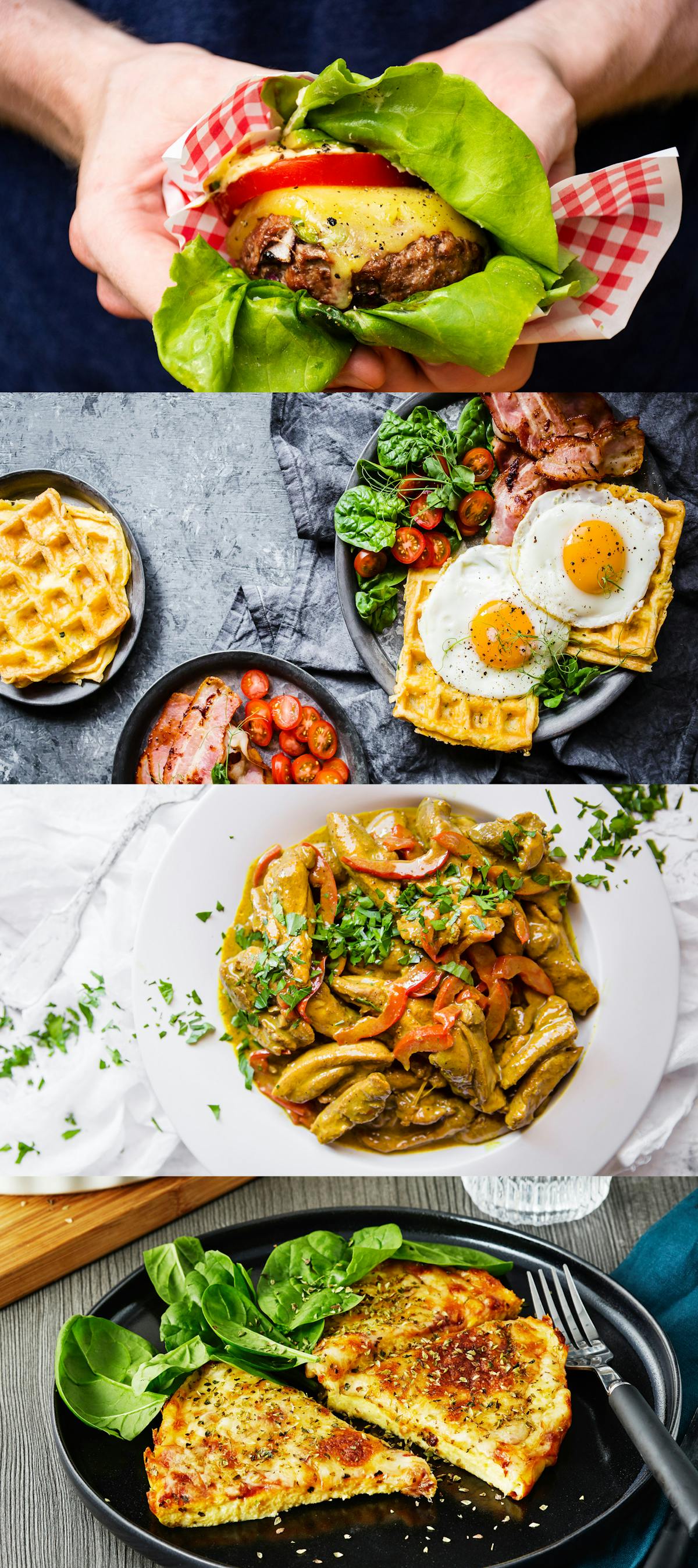Keto challenge
We’ll provide you with all the information and support you need to get started with your new diet and healthier life.
What have you got to lose? Well, maybe a few pounds, your high blood sugar, sugar cravings, and even other health issues like IBS, PCOS, and acne.
What will you eat?
This is no arduous diet, with two weeks of struggle and deprivation. This is two weeks of delicious, satisfying meals. You’ll be amazed at all that you can eat!
Diet Doctor’s recipe team creates the meal plan for each week. It’s designed to be as simple and delicious as possible.
Unlike other diets, you won’t have to worry about feeling hungry or deprived. The foods you’ll eat are filling, flavorful, and nutritious.2
Here are some of the amazing dishes you’ll feast on:




Sign up for free today!
Testimonial
What kind of results can you expect from the two-week keto challenge? Check out Caroline’s story for inspiration:
Why keto?
Everyone is talking about the keto diet. Why? Because it works!
Scientific research and a growing legion of personal stories document the array of positive effects. Common results include weight loss without hunger, improved diabetes management, reduced sugar cravings, calmer stomachs, and improved health markers.34
We know that not everyone will see results by switching to keto eating. But we do know from more than 10 years of experience on our site that many people’s lives are improved so dramatically that we must help as many as we can. You, too, could become one of the hundreds of inspiring success stories.5
Will you experience dramatic results? You’ll only know if you try.
So think of this as an exciting, no-risk, two-week adventure into a new way of eating. It may very well put you on the road to a happier, healthier you for the rest of your life. Doesn’t that sound simply irresistible? You know you want to try it.
Sign up for free today!
The success stories
What kind of results can you expect on a keto diet? Hundreds of people have sent us their success stories. Check out a few for inspiration:
Fantastic – I loved it!
Kick-started my low-carb journey, easy to follow, love the app – it’s brilliant!
I don’t have to wonder and think about what to eat. All I have to do is shop.
Rita
This challenge was user-friendly and a great resource.
I was initially ambivalent about getting started, but the daily emails made it super easy to get started. I didn’t have to log in to the website to find my daily plan. It was sent straight to my email.
The recipes were easy to follow and very tasty. I also felt that I didn’t waste a lot of food because many of the ingredients are consistently used. I highly recommend this website to get started.
Thank you!
Blanca
Hello Diet Doctor staff,
The keto challenge was wonderful, not so much a challenge but a joy. 😊I followed the advice on other Dr. Eenfeldt videos on your site, where he suggested eating as much of the permitted foods to satiety rather than counting macros, which I would find tedious.
I am so pleasantly surprised! I thought I had a sugar addiction. It seems I don’t. On day two — and ever since — I’ve had ZERO cravings for sweet food. This is remarkable for me. And I have lost 13 pounds (6 kilos) in 4 weeks. (I did a week of keto before and after the challenge.)
I am continuing to eat keto as I love it.
Thank you for your excellent website. It’s so informative.
Paulette
Sign up for free today!
Get started keto challenge – sign up - the evidence
This guide is written by Dr. Andreas Eenfeldt, MD, Jill Wallentin and was last updated on August 12, 2022. It was medically reviewed by Dr. Bret Scher, MD on March 11, 2022.
The guide contains scientific references. You can find these in the notes throughout the text, and click the links to read the peer-reviewed scientific papers. When appropriate we include a grading of the strength of the evidence, with a link to our policy on this. Our evidence-based guides are updated at least once per year to reflect and reference the latest science on the topic.
All our evidence-based health guides are written or reviewed by medical doctors who are experts on the topic. To stay unbiased we show no ads, sell no physical products, and take no money from the industry. We're fully funded by the people, via an optional membership. Most information at Diet Doctor is free forever.
Read more about our policies and work with evidence-based guides, nutritional controversies, our editorial team, and our medical review board.
Should you find any inaccuracy in this guide, please email andreas@dietdoctor.com.
Many studies, including this one, have shown that a keto diet is effective for weight loss — even when the participants are allowed to eat as much food as they need to feel satisfied:
Nutrition & Diabetes 2017: Twelve-month outcomes of a randomized trial of a moderate-carbohydrate versus very low-carbohydrate diet in overweight adults with type 2 diabetes mellitus or prediabetes [moderate evidence] ↩
Scientific studies report that low-carb and keto diets are often more effective for weight loss and improving certain health markers when compared to other diets.
This has been demonstrated in several meta-analyses of all top studies. For example, this one:
PLOS ONE 2015: Dietary intervention for overweight and obese adults: comparison of low-carbohydrate and low-fat diets. A meta-analysis [strong evidence]
Ketogenic diets also tend to reduce feelings of hunger:
Obesity Reviews 2014: Do ketogenic diets really suppress appetite? A systematic review and meta-analysis [strong evidence]
Low-carb diets can help lower or even normalize blood sugar, and thus, potentially reverse or put type 2 diabetes into remission:
Diabetes Research and Clinical Practice 2018: Effect of dietary carbohydrate restriction on glycemic control in adults with diabetes: A systematic review and meta-analysis [strong evidence]
Nutrients 2020: Impact of a ketogenic diet on metabolic parameters in patients with obesity or overweight and with or without type 2 diabetes: A meta-analysis of randomized controlled trials [systematic review of randomized trials; strong evidence]
A keto diet has also been shown to normalize blood sugar in over 50% of people with prediabetes
Nutrients 2021: Type 2 Diabetes Prevention Focused on Normalization of Glycemia: A Two-Year Pilot Study [nonrandomized study, weak evidence]
In this study, people on a low-carb diet experienced decreases in cravings for carbs:
Obesity (Silver Spring) 2011: Change in food cravings, food preferences, and appetite during a low-carbohydrate and low-fat diet. [moderate evidence]
More studies: The science of low carb ↩
On a keto diet, a calmer stomach, less gas, fewer cramps and pains, and improvements in IBS symptoms are a common experience in clinical practice. [weak evidence]
This small non-randomized intervention trial found promising effects:
Clinical Gastroenterology and Hepatology 2009: A very low-carbohydrate diet improves symptoms and quality of life in diarrhea-predominant irritable bowel syndrome [weak evidence]
A low-carb diet is generally a low FODMAP diet, and the latter has stronger scientific support for improving IBS symptoms:
Journal of Gastroenterology and Hepatology 2017: The evidence base for efficacy of the low FODMAP diet in irritable bowel syndrome: is it ready for prime time as a first-line therapy? [moderate evidence]
↩Here are stories of improved lives from different people:
In a survey, 86% of people completing this program reported losing weight:
The American Journal of Clinical Nutrition 2007: Low-carbohydrate nutrition and metabolism [overview article] ↩
The idea that fewer carbs is usually more effective is mainly based on the consistent experience of experienced practitioners and stories from people trying different levels of carb restriction [weak evidence]
The only intervention study – to our knowledge – that compared different carb restriction levels were a small trial that found as the carb intake went lower, the trend was towards greater weight loss and greater improvements in cardiometabolic risk factors.
PeerJ 2019: Low-carbohydrate diets differing in carbohydrate restriction improve cardiometabolic and anthropometric markers in healthy adults: a randomized clinical trial [moderate evidence]
Also, better glycemic (blood sugar) control is likely with lower carb intake:
Journal of the American Dietetic Association 2008: Restricted-carbohydrate diets in patients with type 2 diabetes: a meta-analysis [moderate evidence, downgraded as it’s comparing effects between different low-carb trials. There is no RCT comparing low carb to lower carb.]
↩Advances in Food and Nutrition Research 2015: Physical activity and health: “What is old is new again”
[overview article]Exercise has some effect on weight loss – but probably a smaller effect than most people expect:
The American Journal of Medicine 2011: Isolated aerobic exercise and weight loss: a systematic review and meta-analysis of randomized controlled trials [strong evidence for about 1-2 kilos of weight loss]
Cochrane Database of Systematic Reviews 2006: Exercise for overweight or obesity [strong evidence for about 1-1.5 kilos of weight loss]
Exercise interventions might be a bit more effective for overweight and obese adolescents (10-19 years of age):
Sports Medicine 2016: Efficacy of exercise intervention for weight loss in overweight and obese adolescents: meta-analysis and implications [strong evidence for several kilos of weight loss]
Why you shouldn’t exercise to lose weight, explained with 60+ studies ↩
Journal of Consumer Research 2012: Too much of a good thing: the benefits of implementation intentions depend on the number of goals ↩
